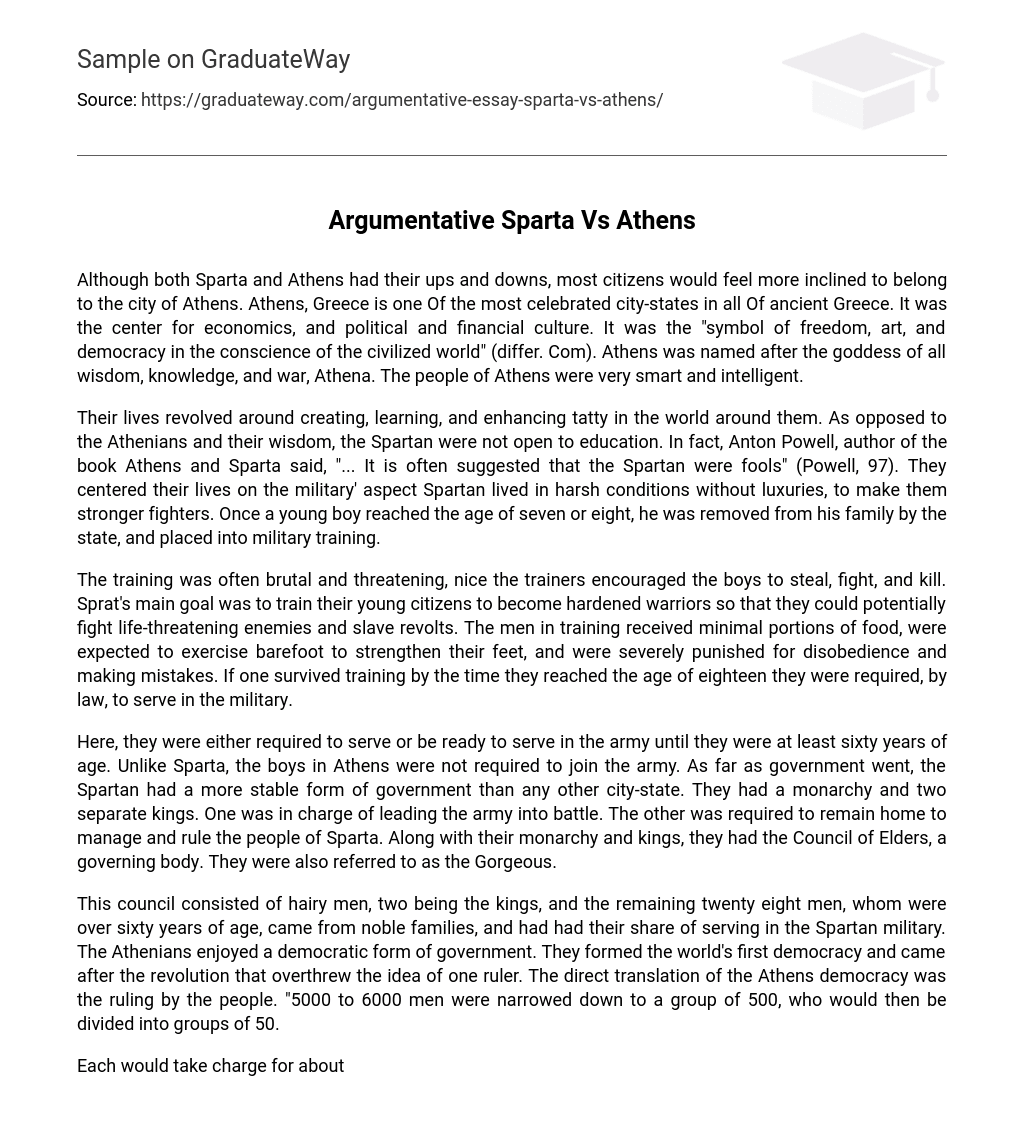Despite experiencing both triumphs and failures, Athens would likely be the preferred choice of citizenship over Sparta. Athens, a city-state in ancient Greece, was highly esteemed for its economic, political, and financial influence. It gained worldwide recognition as the epitome of freedom, art, and democracy (differ.com). The city derived its name from Athena, the goddess linked to wisdom, knowledge, and warfare. The inhabitants of Athens were renowned for their intelligence and resourcefulness.
The Spartans’ lives revolved around creating, learning, and enhancing tatty in the world around them. Unlike the Athenians and their emphasis on wisdom, the Spartans were not open to education. Anton Powell, author of the book Athens and Sparta, pointed out that it is commonly suggested that the Spartans were foolish (Powell, 97). However, their focus was on the military aspect of life as they lived in harsh conditions without luxuries in order to become stronger fighters. When a young boy reached the age of seven or eight, the state would separate him from his family and place him into military training.
The training in Sprat was often brutal and frightening, with the trainers pushing the boys to participate in theft, combat, and even murder. The main goal of Sprat was to shape their young population into hardened soldiers who could fight against powerful enemies and suppress slave revolts. The trainees received very little food, were made to do exercises without shoes to toughen their feet, and faced harsh punishments for not following orders or making mistakes. After successfully completing the training and turning eighteen years old, they were required by law to join the military.
While boys in Athens were not required to join the army, Sparta had a more stable government compared to other city-states. This stability was achieved through a dual monarchy with two kings: one leading the army and the other governing the people. Additionally, there was a governing body called the Council of Elders or commonly known as the Gorgeous.
The council consisted of hairy men, including two kings and twenty-eight men who were over sixty years old. These individuals came from noble families and had served in the Spartan military. In contrast, the Athenians adopted a democratic form of governance. They established the world’s first democracy after a revolution that overthrew absolute rule. Athens’ democracy placed power in the hands of its people. Initially, a group of 5000 to 6000 men was chosen, which was later reduced to 500 individuals and further divided into groups of 50.
According to differ.com, Athens and Sparta had different systems of governance. In Athens, ten generals were chosen for their expertise and served for about a year. On the other hand, Spartan society had contrasting beliefs about women. While family bonds were important in Athens, women mainly focused on domestic tasks such as cooking, cleaning, and raising children. Additionally, Athenian women did not have the freedom to choose their spouses as their fathers arranged their marriages. In contrast, Spartan women’s main duty was to give birth to Spartan men.
During their early years, children were taught to prioritize their physical fitness and overall health. The well-being of the mothers directly affected the welfare of these children. Specifically, if a woman gave birth to a son, the survival of the newborn heavily depended on her own strength and vitality. It was the responsibility of the Council of Elders to assess these infants. If a child appeared weak or had any disabilities, they would be abandoned on a mountain top to die. On the other hand, if an infant was born strong and healthy, it was considered honorable for the mother to give up custody of her child to the state.
During their time in Athens, the mothers had the chance to raise and mold their children into valuable members of society. Both Athens and Sparta were city-states that competed against each other. While Sparta had a skilled military and soldiers, Athens had a formidable navy. The two cities clashed through their alliances – Athens with the Delian League, and Sparta with the Peloponnesian League. In 431 B.C., a war erupted between these two cities as a result of disputes over trade routes, rivalries, and tributes paid by smaller states (vow. differ. Com).
The Peloponnesus War, caused by turmoil and conflict, lasted approximately 28 years with intermittent battles. The Spartans possessed a formidable advantage in land military, but the Athenians prevailed with their daring navy at sea. Despite both cities experiencing significant victories and devastating defeats, the war concluded in 404 B.C., ultimately resulting in the Spartan’s triumph. Nevertheless, Athenian life was characterized by stability, efficiency, and probable enjoyment, contrasting the outcome of the conflict.





